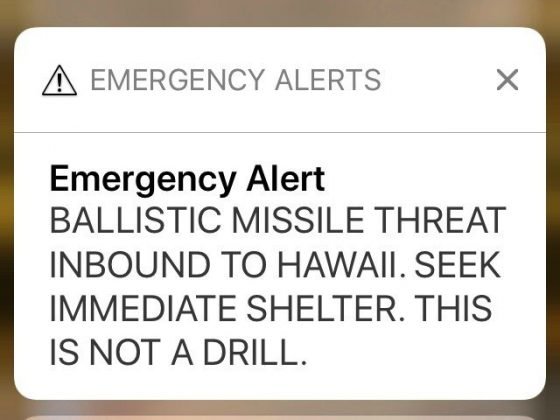As you may already know, Hawaii's Emergency Broadcast System ran a statewide alert telling the residents that there was an incoming ballistic missile this morning around 8 AM local time. Just over thirty minutes later the alert was cancelled and the state's emergency manager Vern Miyagi sent out another alert to disregard the first. When pressed on how this could have happened the EAS manager's office released a statement that one of their employees made an error.
The message that went out on television was " If you are outdoors, seek immediate shelter in a building. Remain indoors well away from windows. If you are driving, pull safely to the side of the road and seek shelter in a nearby building or lie on the floor. We will announce when the threat has ended ".

So what went wrong? It is not like there is a big red button labeled ballistic missile warning that can be easily bumped by a careless intern's elbow. There are very clear procedures to follow that are intended to ensure that false information of exactly this type does not needlessly terrify the population. At the end of the procedure there is the very familiar questioning of your actions by the computer via the " are you sure? " prompt. Regardless of the steps taken to prevent false information being broadcast the operator at the terminal either thought they were sure or pressed the wrong button.
The State of Alaska is kind enough to share the EAS directions for sending a proper alarm to the people that you can read here:
https://ready.alaska.gov/SEOC/Documents/Local_Plans/Juneau_EAS_Plan_V4_2017%20for%20State%20posting.pdf
This EAS blunder was not the first nor the worst. On February 20, 1971 a nation wide alert was issued bearing the rather nebulous message "This is an emergency action notification directed by the president. Normal broadcasting will cease immediately. All stations will broadcast EAN message one preceded by the attention signal, per FCC rules". Naturally television and radio station personalities did their best to avoid panic as the message played automatically on the vast majority of media outlets and stirred fears still fresh from the Cuban Missile Crisis less than a decade earlier.
Another less than settling event was a failed attempt on November 11, 2011 by FEMA to test a nationwide alert where apparently no one in New York received the signal. Others that did receive the alert also reported the channel oddly changing before the message or the alert being interrupted by pop music.
So how does the nation that outspends the next seven highest budgets on defense find a way to botch what seems to be a fairly straightforward operation? Some confusion likely is caused by the private ownership of the overwhelming majority of media outlets. Broadcasting equipment has obviously changed dramatically since the EAS was created in 1963. At any rate FEMA was able to collude with the FCC to provide a working test shortly after the 2011 fail that made all the right devices bleep out the proper test message.
So at the end of the day no serious harm was done and I guess we can be happy that at least it worked. Everyone got the message even if it was wrong and most people never left the couch. After all what would be the point? Hawaii would benefit from advanced warning if any weather other than happy sunshine decided to visit their isolated island but personally I would rather not know if there are missiles on the way. I just try to live each moment as if it were my last so I never have to worry about the end.
Congratulations @christhecoder! You received a personal award!
Click here to view your Board
Do not miss the last post from @steemitboard:
Congratulations @christhecoder! You received a personal award!
You can view your badges on your Steem Board and compare to others on the Steem Ranking
Vote for @Steemitboard as a witness to get one more award and increased upvotes!